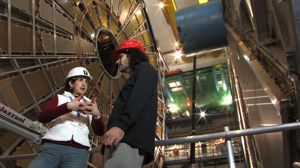I don't want to jinx anything, but it looks like science is actually cool again. Chris Hadfield helped the world fall back in love with outer space. Neil deGrasse Tyson amassed an army of followers by popularizing astrophysics. Even Bill Nye is enjoying a late-career resurgence as an outspoken activist (maybe Dancing with the Stars _actually can_ be a force for_ good in the universe). What all these bright minds have in common is that, like you, they've found ways of making abstract theories and mind-numbing realities exciting to the general public. _Particle Fever banks on that premise. And it works. The actual physics went way over my head, but the storytelling hit me right in the heart.
It helps that the stakes at the center of the film are, literally, astronomical. Many of the people interviewed explain how the search for the elusive Higgs boson - a.k.a. "the God particle" - could unlock the universe as we know it. Billions upon billions of dollars were invested in creating the Large Hadron Collider (LHC) in Switzerland, built and operated by over 10,000 scientists and engineers from over 100 countries. The scientific world has gone all-in on this massive facility, which depends on a 27 kilometre-long tube that circulates and smashes particles at warp speeds. The documentary, in turn, follows a group a physicists as the facility finally flips the on switch. Failure, many say, will mean the end of physics research as we know it.
All the dramatic facts and figures you provide make for a good PowerPoint presentation or press conference (some of which we see in the film), but it's by getting to know the scientists themselves that we learn to care about the results. Many of the people featured have staked their entire careers on theories that hinge completely on these first test results. Diverging quantum theories and their champions are pitted against each other, like supersymmetry theory (in which proven formulas are absolute truths) vs. multiverse theory (in which different formulas exist in different universes). It got to the point where I was completely invested as to where the LHC measurements read between 115 GeV and 140 GeV.
How the hell did you do that?
That's the beauty of science, I guess. Explained in the right way, it's not abstract at all. The visual graphics you oversaw paint clear pictures of complicated math formulas and representations of quantum mechanics (like the moment two physicists dissect a conceptual art installation), but it's the way the filmmakers balanced the science with human stories and emotions that makes the film work. Even if recreating the Big Bang didn't result in the kind of world-ending fireworks some pseudo-scientists predicted, you still helped the filmmakers get the storytelling equation right.
Feeling feverish,
Christopher







